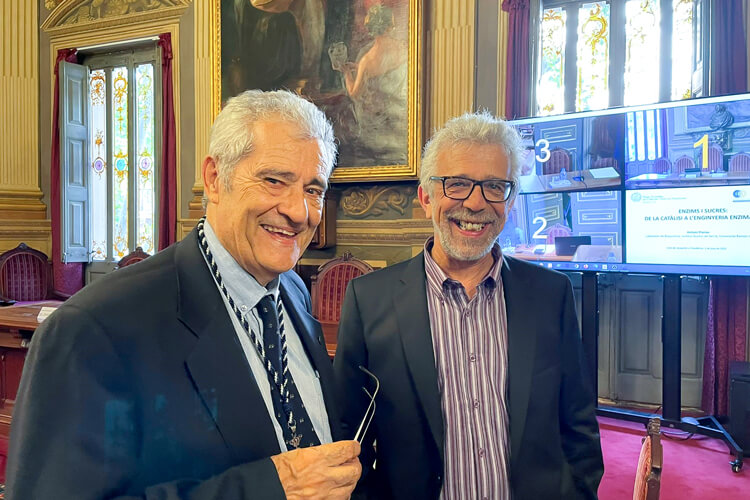Dr Antoni Planas i Sauter, Scholar with the Royal Academy of Sciences and Arts of Barcelona

The ceremony for the scholar-elect Antoni Planas i Sauter to the 3rd Chemistry Section with the Royal Academy of Sciences and Arts of Barcelona (RACAB) was held this past 2 June. This event is greatly important to IQS as a university, and paid tribute to the outstanding professional and scientific career of one of its professors.
With more than 250 years of history, and located since its founding in the Las Ramblas area of Barcelona known as La Rambla de los Estudios, the RACAB emerged as a civil society initiative when Catalan universities were banned and scholars sought other ways to support the advancement of various scientific branches and dialogue among scientists. With the King’s consent, the Academy became the Royal Academy.
I had the pleasure of learning about this history and much more during a relaxed conversation with Dr Miquel Gassiot i Matas. Dr Gassiot i Matas is an emeritus professor with IQS, and was also its director in the past, and he later held the position of rector with Ramon Llull University and was one of the main drivers behind its creation.
Dr Gassiot is currently an emeritus scholar with the RACAB, having previously been an appointed scholar in the 3rd Chemistry Section, of which he was also the director. He told me that he was not the first IQS professor to become a member of the Academy, as he was preceded by Fr. Eduardo Vitoria i Miralles, who joined shortly after the end of the Spanish Civil War. He also held the position of Section 3 director for a time. Thus, Dr Planas is the third IQS professor to become a member of the RACAB.
I asked Dr Gassiot to tell me how the Academy works and how someone can become part of it. He explained that the RACAB is made up of different sections according to the various scientific disciplines and that it has a variable number of members, generally around seventy. When there is an opening, a new position can be created and must be related to a new and growing scientific area (Chromatography at the time of Dr Gassiot’s appointment). The section begins the process of creating a new position by identifying a new scientific field and submits its proposal to the RACAB assembly, which authorizes the creation of a new opening with its approval. The section then seeks out an expert to appoint and submits its proposal to the assembly. Following the assembly’s approval, the nominated scientist becomes an elected scholar. The first task involves drafting what is called the admission report, which must address the new scientific field. Once the elected scholar presents this report to the members of the RACAB, and it is favourably reviewed by the director of the section in question, the nominee becomes a scholar.
Thus, in the case of Dr Planas, the section that made the proposal for a new scholar was Chemistry, and the new scientific field was Bioengineering. Dr Planas presented his admission report, entitled “Enzymes and sugars: from catalysis to enzymatic engineering,” at the ceremony on 2 June, which was then addressed by His Excellency Dr Ernest Giralt i Lledó, the responding scholar and sponsor.
Dr Planas was then awarded the Academy’s medal, a symbolic element officially making the elected member a scholar. The President of the RACAB generally awards this medal but, in this case it was Dr Gassiot himself who had the honour of doing so, with Dr Planas receiving medal number 64. It was an emotional event for all of us who were lucky enough to be there, even more so for the two professors.
One of the duties of any scholar is to do what is called “shift work,” or preparing a conference on a topic within their field that leads to reflection and dialogue among the other members of the corresponding section.
We warmly congratulate His Excellency Dr Antoni Planas i Sauter and are confident that he will continue with his scientific research, commitment to higher education, and involvement in sharing scientific knowledge.
Núria Vallmitjana i Palau
Director of IQS Tech Transfer

